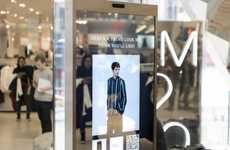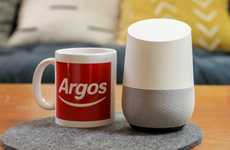



Retailers tap voice tech to supercharge their in-store experience
Trend - While some companies choose to leverage voice assistant technology to create a contactless path-to-purchase, others are tapping into the hesitation that some consumers have against actually purchasing products through voice technology and are instead working to leverage it to drive in-store sales.
Insight - Some contemporary consumers still prefer to shop in-store instead of online as physical interaction allows them to better inspect the products that they are interested in. Even in brick-and-mortar establishments, consumers prioritize convenience and, therefore, emphasize the need for their shopping to be efficient—from seamless point-of-purchase experiences to omnipresent customer service. When this desire is met, consumers feel more secure and better informed to determine whether the product is right for them.
Insight - Some contemporary consumers still prefer to shop in-store instead of online as physical interaction allows them to better inspect the products that they are interested in. Even in brick-and-mortar establishments, consumers prioritize convenience and, therefore, emphasize the need for their shopping to be efficient—from seamless point-of-purchase experiences to omnipresent customer service. When this desire is met, consumers feel more secure and better informed to determine whether the product is right for them.
Workshop Question - How does your consumer feel about the way your brand is engaging with emerging technologies?
Trend Themes
1. Voice Technology Driven In-store Sales - Retail companies are using voice assistants to enhance customers' in-store experiences, providing product recommendations and outfit pairing while facilitating reservations and point-of-purchase services.
2. Smart Mirror Trials to Enhance In-store Customer Experience - Retail stores are partnering with tech companies to experiment with smart mirrors, incorporating voice and facial recognition to enable virtual product try-ons, outfit pairing suggestions, and direct in-store ordering services.
3. AI-powered Voice Concierge for Customer Service - Uniqlo and other retail brands are incorporating AI-powered voice assistants as digital concierges within their mobile apps to automate product recommendations and integrate voice-enabled customer service, bridging e-commerce and in-store experience for a seamless interaction.
Industry Implications
1. Retail Industry - Retail businesses can adopt voice-enabled technology to improve their in-store experience, leverage customer service and recommendations, while managing inventory and sales growth.
2. Fashion and Apparel Industry - Fashion and apparel retailers can leverage smart mirrors to enhance their customers' in-store shopping experience, enable virtual try-on and outfit-pairing, and facilitate direct ordering services.
3. Artificial Intelligence Industry - The AI-powered voice assistant technology offers great disruptive opportunities for customer service, mobile applications, e-commerce, and in-store experience with features like facial and voice recognition or automated recommendations.






























